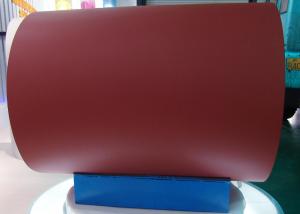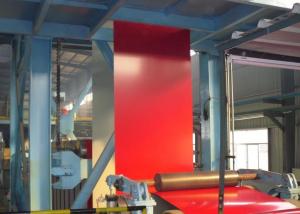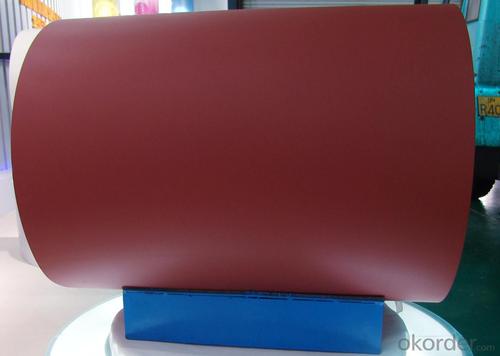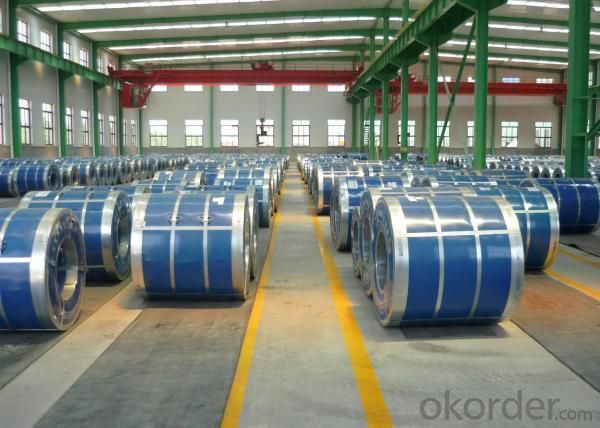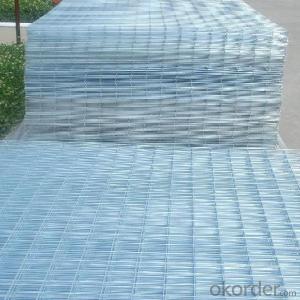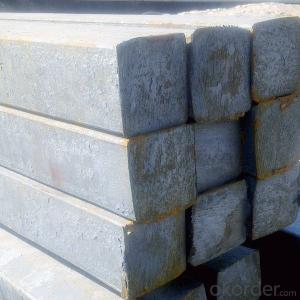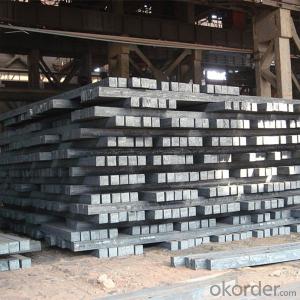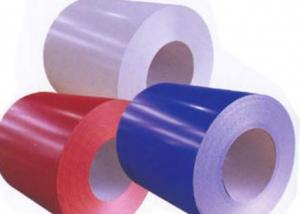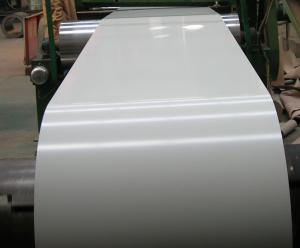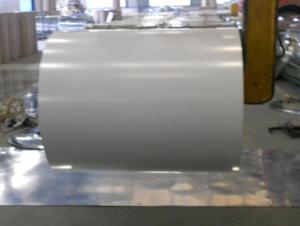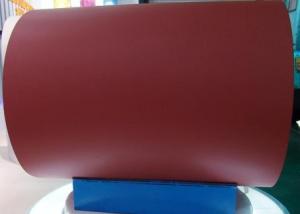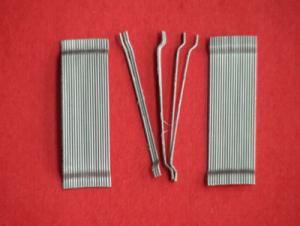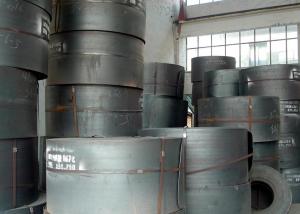Best Quality for Prepainted Galvanized Steel - Red
- Loading Port:
- China Main Port
- Payment Terms:
- TT or LC
- Min Order Qty:
- 25mt m.t.
- Supply Capability:
- 20000 Metric Tons Per Month c Tons Per Month m.t./month
OKorder Service Pledge
OKorder Financial Service
You Might Also Like
General Information Of Prepainted Galvanized Steel Coil
With GI as base metal, after pretreatment (degrease and chemical treatment) and liquid dope with several layers of color, then after firing and cooling, finally the plate steel is called pre-painted galvanized steel. Pre-painted galvanized steel is good capable of decoration, molding, corrosion resistance. It generally displays superior workability, durability and weather resistance.
|
Thickness 0.23-1.2mm (BMT) |
|
Width 900-1250mm |
|
Zinc Coating 80-275g/m2 |
|
Color According to RAL color fan |
|
Internal Diameter 508mm or 610mm |
|
Coil Weight 3-8MT |
|
Quality Commercial and structural quality |
|
Paint Polyester paint for topside, epoxy for reverse |
|
Standard JIS G 3312, ASTM A755M, EN 10169 |
|
Base Steel Grade SGCC,SGCD,DX51D+Z,DX52D+Z;S200GD,S220GD, S280GD,S350GD,CS,FS,SS |
Chemical Composition Of Prepainted Galvanized Steel Coil
|
C |
Si |
Mn |
P |
|
0.04-0.06% |
0.01-0.03% |
0.18-0.22% |
0.014-0.016% |
Technical Data Of Prepainted Galvanized Steel Coil
|
Yield Strength |
(Mpa) 280-320 |
|
Tensile Strength |
(Mpa) 340-390 |
|
Elongation |
20%-30% |
|
Reverse Impact |
9J |
|
T-bending |
≥2T |
|
Pencil Hardness |
≥2H |
|
Duration Of Salt Spray Test |
500 H |
|
Bending At 180 Degree |
No crack, purling and fraction |
Application Of Prepainted Galvanized Steel Coil
Outdoor:
roof, roof structure, surface sheet of balcony,
frame of window, door, door of garage, roller shutter door, booth, Persian blinds, cabana, etc.
In door:
door, isolater, frame of door, light steel structure of house, home electronic appliances, etc.
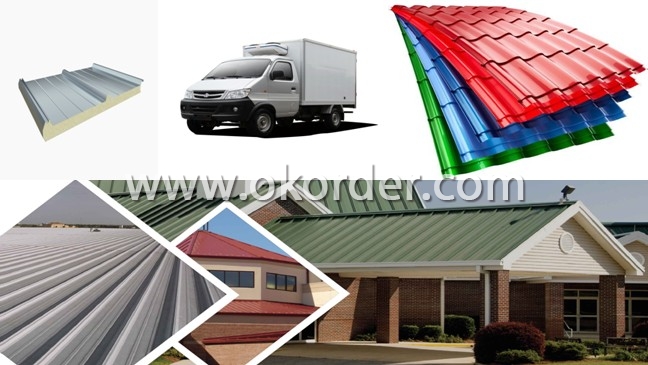
Packaging & Delivery Of Prepainted Galvanized Steel Coil
Anti-damp paper inside full wrapped with plastic film, iron sheet outside on wooden pallet in 20 feet container with 25mt.
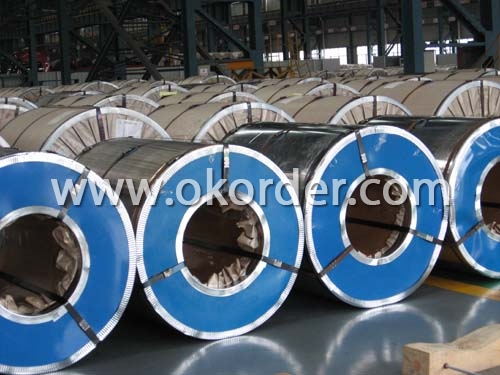
- Q: How is steel rebar welded for reinforcement in concrete structures?
- Steel rebar is welded for reinforcement in concrete structures using a process called "rebar welding." It involves heating the ends of the rebar using an electric arc, creating a molten pool. The molten ends of the rebar are then pressed together, allowing them to fuse and form a strong and continuous bond. This welding technique ensures that the rebar maintains its integrity and provides the necessary reinforcement for the concrete structure.
- Q: What are the different types of steel tanks and containers available?
- There are several types of steel tanks and containers available, including above-ground storage tanks, underground storage tanks, pressure vessels, intermediate bulk containers (IBCs), and shipping containers. Each type serves a specific purpose and is designed to meet different storage or transportation needs.
- Q: What are the different types of steel springs and their uses?
- There are several types of steel springs, each with their specific uses. Some common types include compression springs, extension springs, torsion springs, and flat springs. Compression springs are designed to resist compression forces and are used in applications such as automotive suspensions, mattresses, and industrial machinery. Extension springs, on the other hand, are designed to absorb and store energy when pulled apart and are commonly used in garage doors, trampolines, and various mechanical devices. Torsion springs provide a rotational force and are commonly found in clothespins, garage door systems, and various small appliances. Flat springs, also known as leaf springs, are used in applications that require high strength and flexibility, such as automotive suspensions, agricultural equipment, and heavy machinery. Each type of steel spring has its unique properties and applications, making them essential components in various industries.
- Q: How is steel used in the manufacturing of consumer goods?
- Steel is commonly used in the manufacturing of consumer goods due to its strength, durability, and versatility. It is used to create various components and structures in products such as appliances, automobiles, furniture, tools, and electronics. Steel is essential for providing stability and support, ensuring the longevity and safety of consumer goods.
- Q: What are the different types of steel forgings and their applications in the construction of power transmission lines?
- There are several different types of steel forgings commonly used in the construction of power transmission lines. These include: 1. Anchor shackles: These forgings are used to secure the guy wires, which provide stability to the transmission towers. 2. Clevises: Clevis forgings are used in the construction of suspension insulator assemblies, which connect the transmission wires to the towers. 3. Eye bolts: Eye bolts are used to attach various hardware components to the transmission towers, such as grounding equipment or insulator strings. 4. Yoke plates: Yoke plates are used in the construction of tension insulator assemblies, which help distribute the weight and tension of the transmission wires. 5. Pole line hardware: This category includes various steel forgings such as pole bands, brackets, and clamps, which are used to secure the transmission towers to the poles. Overall, steel forgings play a crucial role in the construction of power transmission lines by providing strength, durability, and reliable connections between various components.
- Q: How is steel plate cut using CNC machines for fabrication?
- Steel plate is cut using CNC machines for fabrication by following a step-by-step process. First, a digital design or blueprint is created using computer-aided design (CAD) software. This design is then converted into a program that can be understood by the CNC machine. The steel plate is securely clamped onto the machine's work surface, and the cutting tool, typically a high-speed rotating cutter or laser, is positioned above the plate. The CNC machine then moves the cutting tool along the programmed path, precisely cutting the steel plate according to the design. The machine's computer-controlled accuracy ensures that the cuts are made with high precision and repeatability.
- Q: What are the applications of steel in the petrochemical industry?
- Steel is widely used in the petrochemical industry due to its excellent properties such as high strength, corrosion resistance, and durability. It is used in various applications such as pipelines, storage tanks, and equipment for processing and refining petrochemicals. Steel pipelines transport oil, gas, and other petrochemical products over long distances, while storage tanks made of steel safely store these substances. Additionally, steel equipment used in the petrochemical industry, such as heat exchangers and reactors, are crucial for efficient and safe processing of petrochemicals. Overall, steel plays a vital role in ensuring the reliability and safety of petrochemical operations.
- Q: What are the applications of steel in the water treatment industry?
- Steel is widely used in the water treatment industry due to its durability, corrosion resistance, and strength. It is commonly used in the construction of water treatment plants, pipelines, tanks, and equipment such as pumps and valves. Additionally, steel is used in filtration systems, screens, and membranes, ensuring efficient water purification processes.
- Q: What are the different types of steel wire mesh products?
- There are several types of steel wire mesh products, including welded wire mesh, woven wire mesh, expanded metal mesh, and perforated metal mesh. Each type has its own unique characteristics and applications. Welded wire mesh is made by welding individual wires together to create a strong and durable mesh panel. Woven wire mesh is created by weaving individual wires together in an interlocking pattern, providing flexibility and strength. Expanded metal mesh is produced by cutting and stretching a metal sheet, resulting in a diamond-shaped pattern with open areas. Perforated metal mesh is made by punching holes in a metal sheet, offering various hole sizes and patterns for different purposes.
- Q: How are steel sheets used in the manufacturing of industrial machinery?
- Steel sheets are commonly used in the manufacturing of industrial machinery as they provide strength, durability, and versatility. These sheets are used for constructing machine frames, enclosures, and supports, as well as for creating various components such as gears, shafts, and brackets. The ability to mold and shape steel sheets allows manufacturers to customize machinery according to specific requirements, ensuring optimal performance and reliability.
1. Manufacturer Overview
| Location | Zhejiang, China |
| Year Established | 1999 |
| Annual Output Value | US$1 Million - US$2.5 Million |
| Main Markets | Europe; Africa; Mid East; Southeast Asia |
| Company Certifications | ISO9001;ISO14001 |
2. Manufacturer Certificates
| a) Certification Name | |
| Range | |
| Reference | |
| Validity Period |
3. Manufacturer Capability
| a) Trade Capacity | |
| Nearest Port | Shanghai Port |
| Export Percentage | 41% - 50% |
| No.of Employees in Trade Department | 50-80 |
| Language Spoken: | Chinese, English |
| b) Factory Information | |
| Factory Size: | Above 100,000 square meters |
| No. of Production Lines | 5 |
| Contract Manufacturing | OEM Service Offered |
| Product Price Range | Average |
Send your message to us
Best Quality for Prepainted Galvanized Steel - Red
- Loading Port:
- China Main Port
- Payment Terms:
- TT or LC
- Min Order Qty:
- 25mt m.t.
- Supply Capability:
- 20000 Metric Tons Per Month c Tons Per Month m.t./month
OKorder Service Pledge
OKorder Financial Service
Similar products
Hot products
Hot Searches
Related keywords
